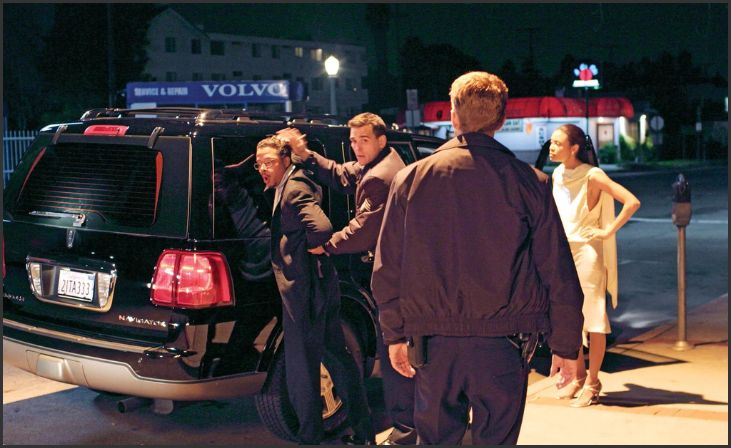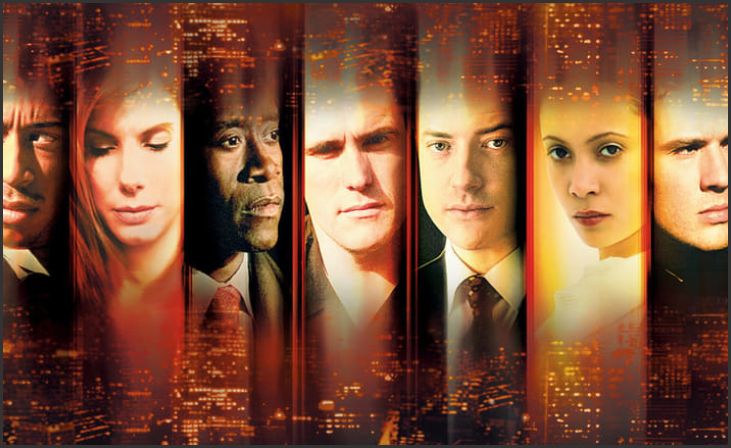The Most Unworthy Oscar Wins In Academy Award History – The Academy Awards, widely known as the Oscars, stand as the pinnacle of recognition in the film industry, honoring outstanding achievements in cinema. While these accolades celebrate the artistry and dedication of filmmakers, the subjective nature of film appreciation has occasionally led to contentious choices, giving rise to a category of wins deemed unworthy.
In this exploration, we delve into instances where Oscar victories, particularly in Best Picture, Best Director, Acting Awards, and Technical Categories, have sparked controversy and criticism.
As we navigate through cinematic history, we scrutinize the factors contributing to these perceived missteps and reflect on the broader implications, acknowledging the ongoing dialogue surrounding the credibility and fairness of the Oscars.
Most Unworthy Oscar Wins In Academy Award History
Crash (2004) – Best Picture (2006)

“Crash” winning Best Picture in 2006 remains one of the most contentious Oscar decisions. Criticized for its simplistic portrayal of race relations, the film beat out strong contenders like “Brokeback Mountain,” causing widespread debate.
Many argued that “Brokeback Mountain” deserved the honor for its groundbreaking representation of LGBTQ+ themes and cultural impact.
“Crash” became a symbol of the Academy’s occasional preference for safer choices over more challenging and innovative films, leaving a lasting mark on discussions about the Oscars’ decision-making process.
Also, Read – Coolest Anime Characters of All Time
Shakespeare in Love (1998) – Best Picture (1999)
“Shakespeare in Love” winning Best Picture in 1999 sparked controversy, as many believed “Saving Private Ryan” deserved the honor for its powerful portrayal of war. The romantic comedy’s victory was perceived as a surprise and led to debates about whether its charm outweighed the historical significance and impact of Spielberg’s war epic.
Critics and audiences questioned the Academy’s decision, making “Shakespeare in Love” one of the most discussed and contested Best Picture winners. Despite its commercial success and critical acclaim, the film’s triumph over “Saving Private Ryan” remains a notable moment in Oscar history.
Forrest Gump (1994) – Best Picture (1995)
“Forrest Gump” winning Best Picture in 1995 stirred controversy, with debates persisting about its triumph over competitors like “Pulp Fiction” and “The Shawshank Redemption.” The film’s sentimental journey through historical events was criticized by some who favored the edgier and groundbreaking narratives of its fellow nominees.
While “Forrest Gump” achieved widespread popularity, its victory underscored divisions between mainstream appeal and critical acclaim, becoming emblematic of debates surrounding the Academy’s choices.
The film’s success has endured, but discussions about its Oscar win continue to highlight differing perspectives on cinematic merit and the Academy’s decision-making process.
Roberto Benigni for Life is Beautiful (1998) – Best Actor (1999)
Roberto Benigni’s win for Best Actor in 1999, for his role in “Life is Beautiful,” sparked both applause and controversy.
While his performance as a father shielding his son from the harsh realities of a concentration camp was praised for its emotional depth, some felt it overshadowed other powerful performances, notably Edward Norton in “American History X.”
Benigni’s exuberant personality and the film’s tonal shifts contributed to the debate, making it one of the more polarizing Oscar victories.
Despite the criticisms, Benigni’s win remains a memorable moment in Academy Award history, reflecting the complex interplay of performance, storytelling, and public perception.
Also, Read – HBO Miniseries That Justify Paying For a Subscription
Gwyneth Paltrow for Shakespeare in Love (1998) – Best Actress (1999)
Gwyneth Paltrow’s win for Best Actress in 1999 for “Shakespeare in Love” generated mixed reactions. While her portrayal of Viola garnered praise for its charm and vulnerability, some argued that Cate Blanchett’s performance in “Elizabeth” displayed more depth and complexity.
The controversy around Paltrow’s victory is often linked to the debate over whether the film’s overall success influenced her win.
Despite the dissent, Paltrow’s Oscar win marked a significant moment in her career, but discussions about the perceived competition and the film’s impact on the outcome persist in discussions about the Academy’s decision-making process.
Crash (2004) – Best Original Screenplay (2006)

“Crash” winning Best Original Screenplay in 2006 was met with controversy. While the film’s exploration of racial tensions in Los Angeles earned praise, its simplistic approach and melodramatic narrative drew criticism.
The win over complex and innovative scripts, such as “Brokeback Mountain” and “Munich,” fueled debates about the Academy’s choices. Many argued that the film’s themes were handled with less nuance compared to its competitors.
“Crash” remains a divisive winner, emblematic of the Academy’s occasional preference for emotionally charged narratives over more nuanced and groundbreaking storytelling in the Best Original Screenplay category.
Green Book (2018) – Best Picture (2019)
“Green Book” winning Best Picture in 2019 sparked controversy due to its simplistic portrayal of race relations and its handling of the true story it was based on. Critics argued that the film’s perspective, centered on a white character, overshadowed the experiences of its African American protagonist.
The win over films like “BlacKkKlansman” and “Roma” raised questions about the Academy’s understanding of racial issues. Despite its critical acclaim, “Green Book” became a symbol of debates around Hollywood’s approach to diversity and storytelling.
The film’s victory underscored ongoing concerns about the Academy rewarding safer narratives over more challenging and authentic perspectives.
Gladiator (2000) – Best Picture (2001)
“Gladiator” winning Best Picture in 2001 was a triumph for its epic scale and visual spectacle, but it faced criticism for prevailing over films like “Crouching Tiger, Hidden Dragon” and “Traffic.” While praised for its action and Russell Crowe’s performance, some argued that the film’s narrative lacked the depth and complexity of its competitors.
The victory highlighted the Academy’s occasional preference for grandiose productions, even if they were perceived as more style than substance. “Gladiator” remains a divisive Best Picture winner, emblematic of debates around the prioritization of cinematic spectacle over intricate storytelling in the Oscars.
Nicole Kidman for The Hours (2002) – Best Actress (2003)
Nicole Kidman’s win for Best Actress in 2003 for “The Hours” drew mixed reactions. While her portrayal of Virginia Woolf was lauded for its depth and nuance, some argued that Renée Zellweger’s performance in “Chicago” or Julianne Moore’s in “Far from Heaven” were equally or more deserving.
Kidman’s transformative role and the film’s critical acclaim contributed to her win, yet debates persist about the overall competition in the category. Kidman’s victory remains a topic of discussion, reflecting the subjective nature of acting accolades and the diverse opinions on the performances showcased in the nominated films.
Crash (2004) – Best Editing (2006)

The win for “Crash” in the Best Editing category at the 2006 Oscars remains a source of controversy. While the film explored racial tensions in Los Angeles, its editing was criticized for disjointed storytelling and melodrama. The victory over contenders like “Brokeback Mountain” and “Munich,” known for their cohesive and impactful editing, raised questions about the Academy’s criteria.
Many felt that the complexity of the other nominees’ narratives demonstrated superior editing craftsmanship.
“Crash” winning in this category is often cited as an example of the Oscars favoring emotional impact over technical excellence, contributing to ongoing discussions about the Academy’s decision-making process.
Conclusion
In conclusion, the Oscars, though prestigious, are not immune to subjective judgments and controversies. The examination of unworthy wins across categories highlights the challenges in navigating the complex landscape of film appreciation.
As the industry evolves, the Oscars must adapt, fostering transparency and fairness in their recognition of cinematic excellence. Ultimately, the ongoing discourse surrounding deserving and undeserving victories underscores the dynamic nature of artistic evaluation and the need for continual reflection within the esteemed realm of the Academy Awards.
FAQs
An “unworthy” Oscar win is subjective and often refers to instances where a film or individual received an award despite being considered by some as less deserving due to factors like critical reception, artistic merit, or the presence of more deserving competitors.
Oscar winners are chosen through a voting process by members of the Academy of Motion Picture Arts and Sciences. Different branches within the Academy vote for nominees in their respective categories, and the entire Academy votes for the winners in most categories.
Yes, popularity can influence Oscar wins. Factors like box office success, industry politics, and a film’s cultural impact may contribute to its chances of winning, sometimes at the expense of artistic or critical considerations.

